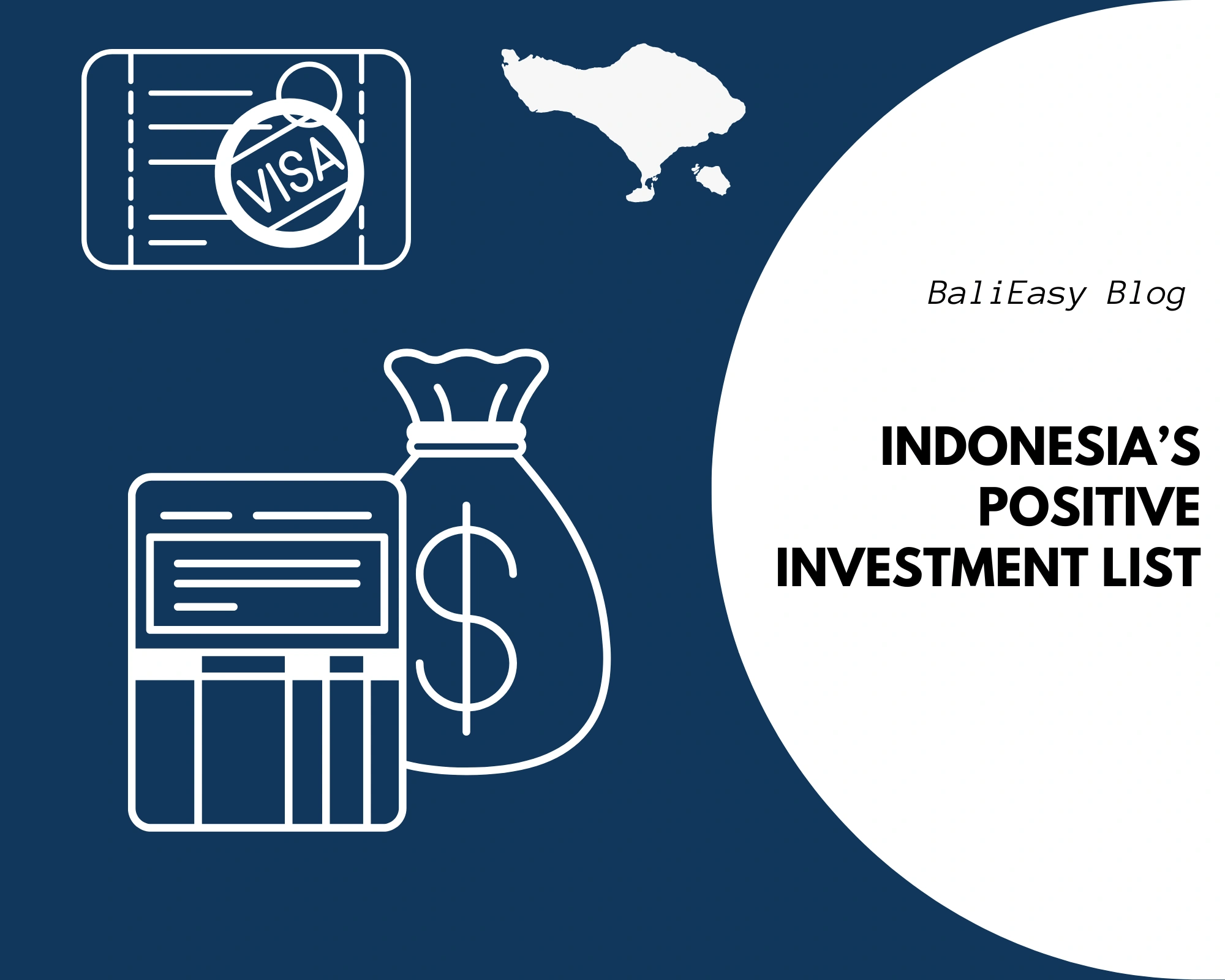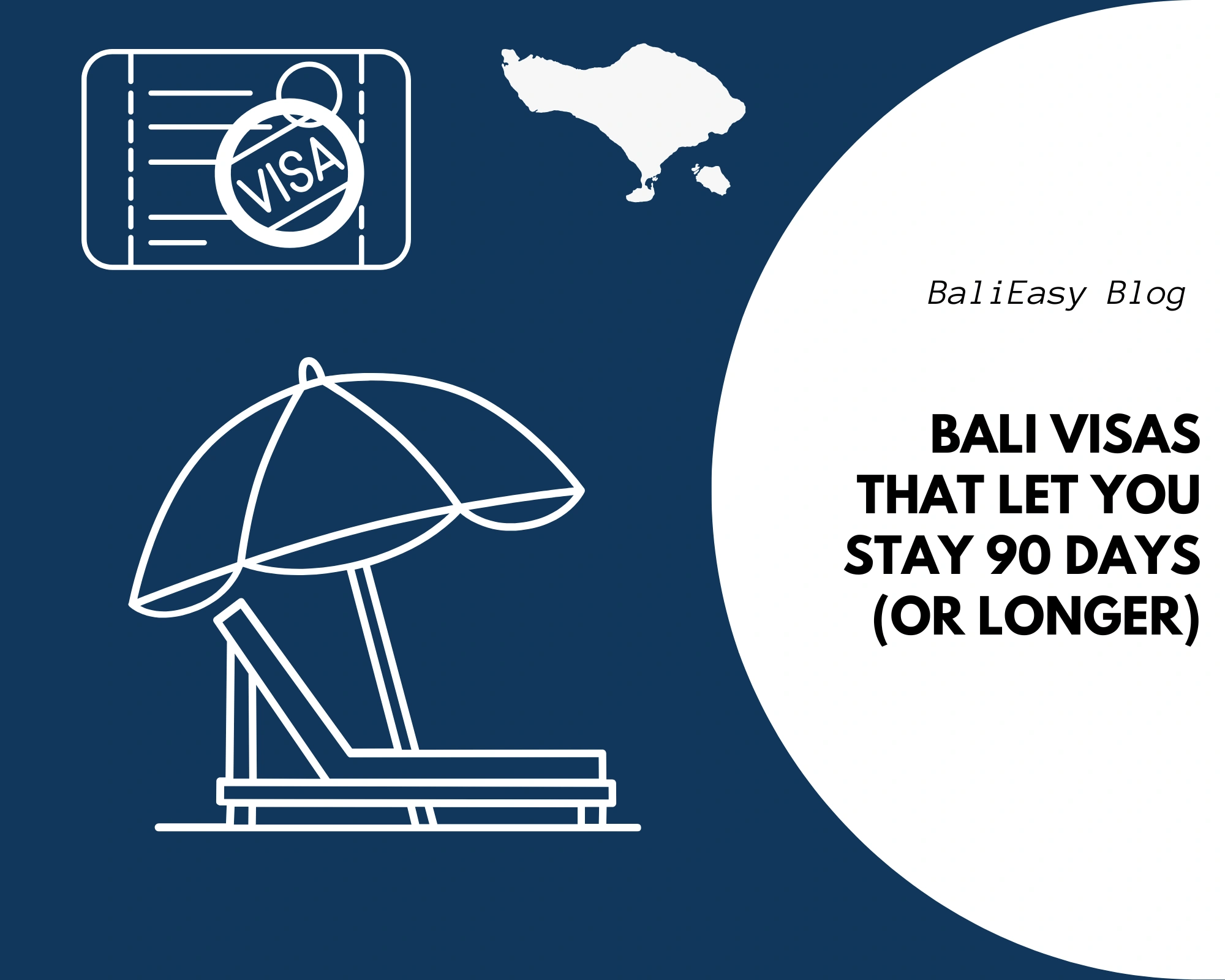
Indonesia’s Positive Investment List
Indonesia’s Positive Investment List is officially the Daftar Prioritas Investasi (DPI) inside Indonesia’s rules on Business Fields for Investment (Bidang

Quick Answer: Yes, you can live in Bali long term, but you’ll need the right visa, suitable accommodation, and essentials like a local SIM or eSIM with proper IMEI registration.
Monthly living costs start at around USD 900 for a simple lifestyle, with more comfort or family setups costing higher. This guide covers visas, housing, daily expenses, and everything else you need to prepare.
You can, and many people do. But to stay longer than 60 days, you need a visa that fits your plans. Here are some options:
Good for short-term visits. Grants 30 days and can be extended once for a total of 60 days. After that, you must leave Indonesia or upgrade your visa.
Popular for travelers and remote workers. Valid for 60 days and extendable twice for up to 180 days total. It requires a sponsor, which Visa BaliEasy can provide as part of our Indonesia Single Entry Tourist Visa (C1/211A) service.
Ideal for anyone aged 55 or older who wants to settle down and enjoy island life without working. Valid for one year and renewable.
If you’re employed by a company outside Indonesia and earn a stable income, this is the right visa. It’s valid for one year and lets you live in Bali legally while working remotely.
For high-net-worth individuals who can show proof of large savings or property investment. Allows stays of up to 5 or 10 years.
Not sure which visa to choose? Our article Which Bali Visa Is Right for You? offers a clear comparison.
You can enter Indonesia and purchase a Visa on Arrival (VoA) at the airport. This gives you 30 days, with one extension allowed. After 60 days, you need to leave or switch to a long-term visa. For details on how the VoA works, check our guide on the Bali Visa on Arrival.
If you’re planning to stay in Bali for around 90 days, the best option is the C1/211A visa, which gives you 60 days and can be extended without needing to exit the country.
It’s more convenient than the e-VOA for longer stays and avoids the hassle of visa runs.
For visa extensions Indonesian Immigration require in-person biometric verification (photo and fingerprints) at an immigration office.
You can read more about how this works in our guide to Indonesia Biometric Visa Extension.
At the same time, if you plan to use mobile data, you’ll need to consider Indonesia’s IMEI rules. Local SIM cards and Telkomsel eSIMs (like those from eSIM BaliEasy) are valid for 30 days per IMEI.
For the second month, you can simply buy another eSIM, but by the third month, Telkomsel requires you to visit a Grapari office to extend your IMEI registration.
For longer stays, IMEI registration with Bea Cukai (Indonesian Customs) may be required, especially if you want uninterrupted service beyond 90 days.
This policy helps prevent the circulation of stolen or counterfeit phones and curbs the illegal phone trade, protecting both consumers and the mobile ecosystem.
Here’s a mid-range estimate of monthly costs for one person:
|
Item |
Cost (USD) |
| Rent (guesthouse) | $300 – $450 |
| Meals (local & cafes) | $250 – $400 |
| Scooter rental & petrol | $60 – $100 |
| Gym or yoga membership | $20 – $100 |
| Visa fees (if applicable) | $60 – $180 |
Total: $900 – $1,300, depending on lifestyle.
Finding the right place to stay in Bali depends on your budget, lifestyle, and how long you plan to stay. Here are the most common options:
Accommodation Types
Popular Areas
Eating in Bali is both affordable and diverse, but knowing where and how to eat makes a big difference during a long stay.
One of the best parts of staying long-term in Bali is the chance to join active and welcoming communities. Whether you’re a remote worker, fitness enthusiast, or just looking to meet people, the island has plenty of ways to connect.
Popular coworking spaces like BWork (Canggu), Outpost (Canggu/Ubud), and Uluwatu Hub aren’t just about desks and Wi-Fi. They host social nights, workshops, and community dinners where you can meet other entrepreneurs, freelancers, and digital nomads.
If staying fit is your way of meeting people, South Bali is full of options. Body Factory (Canggu) offers high-end facilities and group classes, while Bali Training Centre (Bingin/Uluwatu) is known for its outdoor HIIT and martial arts community.
Gyms in Sanur and Jimbaran also cater to long-stay expats with flexible memberships.
Padel has exploded in Bali as a social sport. You’ll find active clubs like Jungle Padel (Canggu, Pererenan, Ungasan), Island Padel (Uluwatu), and Sanur Padel Club, all running social nights, leagues, and WhatsApp groups where newcomers are welcome.
For something different, try Bali Hash House Harriers, a running club that mixes trail running with post-run socializing.
Or join community clean-ups such as One Island One Voice, which gathers locals and expats for island-wide beach clean-ups.
Bringing your family to Bali can be a rewarding experience, but planning ahead is essential. Here are the key things to know:
Bali has several international and bilingual schools, mainly in Canggu, Sanur/Renon, and Ubud. Options include Green School (Ubud), Canggu Community School, Dyatmika (Sanur), and Bali Island School. It’s best to secure admission early, as popular grades fill quickly.
Families usually rely on private hospitals such as BIMC (Kuta/Nusa Dua/Ubud), Siloam (Kuta), or Kasih Ibu (Denpasar), alongside international clinics like SOS Medika (Sanur).
Emergency numbers to save: 112 (general), 118/119 (ambulance). Foreigners should carry private health insurance; those with KITAS/KITAP may also register for the national BPJS scheme after 6 months.
If you stay in Indonesia for over 183 days in a year, you may be considered a tax resident and taxed on worldwide income.
Rates are progressive (5%–35%). Some foreigners may qualify for a 4-year territorial regime, meaning only Indonesian-sourced income is taxed during that period.
Always consult a local tax advisor before settling long term.
Bali offers plenty for children and parents alike: Waterbom (Kuta), Finns Recreation Club (Canggu), Bali Safari & Marine Park, and Bali Zoo (Gianyar) are popular family spots. Sanur’s beach path is ideal for biking with kids, while Ubud day trips combine culture and nature.
It is possible to make Bali your permanent home by securing an Indonesian Permanent Stay Permit (KITAP) after first holding a Temporary Stay Permit (KITAS) for the required time, or by applying for a Second Home Visa if you meet the financial qualifications.
Many long-term residents are attracted by Bali’s tropical climate, relatively low living costs, and lively culture.
However, achieving a smooth transition requires careful visa planning, sufficient financial preparation, and a good understanding of the local way of life.
During transitions from a temporary stay permit (KITAS) to longer-term residence, a Bridging Visa may be required to legally cover your stay while immigration processing is ongoing.
It’s critical to ensure your visa or stay permit remains valid at all times. Even a short overstay can result in daily fines, immigration issues, or future entry problems.
For details on penalties and enforcement, see our full guide on Indonesia Visa Overstay Rules & Fines.
Living long-term in Bali is absolutely possible, but it takes the right preparation, whether that’s choosing the right visa, finding accommodation, or planning your daily costs.
With the right support, Bali can become more than just a destination; it can feel like home.
At Visa BaliEasy, we take the confusion out of visas so you don’t have to worry about paperwork, overstays, or last-minute extensions.
Whether you’re staying for a few months or looking at Bali as your long-term base, we’ll guide you to the right option and handle the process smoothly, so you can focus on enjoying island life.

Indonesia’s Positive Investment List is officially the Daftar Prioritas Investasi (DPI) inside Indonesia’s rules on Business Fields for Investment (Bidang

For 90 days in Bali without leaving Indonesia, the most practical option for tourists is the C1 Tourist Visit Visa
WhatsApp us
📌 How It Works: